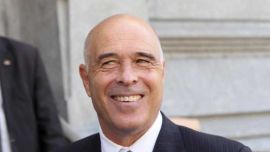The government has announced it is sending a bill to Congress to turn the INDEC national statistics bureau into an independent institution.
On Thursday afternoon, Finance Minister Hernán Lacunza announced that a bill had been sent to Congress to turn bureau into an entirely independent and autonomous unit. The move was widely interpreted as an anticipatory move against the imminent return of Kirchnerismo to power, with Peronist leader Alberto Fernández set to assume the presidency on December 10.
For almost nine years (from early 2007 to late 2015), INDEC systematically doctored the economic and other data according to the government’s propaganda needs, minimising inflation and measuring poverty at 6.3 percent in 2013, before discontinuing the index altogether as “discriminatory” under the Cristina Fernández de Kirchner presidency.
Since assuming office in 2015, President Mauricio Macri sought to overhaul the bureau and restore its credibility, making it the prime source for data on Argentina's economy and population.
Speaking Thursday, Lacunza showered praise on INDEC's current director, Jorge Todesca, hailing his work and declaring that he had left behind "an institutional legacy."
Under the previous presidency statistics had had to be measured by “imperfect private-sector substitutes” in default of serious official data, Lacunza reproached.
New rules?
According to the bill, INDEC – first founded in 1968 – will fall under the purview of the Cabinet chief, but be fully autonomous, including legal status and its own assets. Its director would have a fixed term of five years and be chosen by the Senate Appointments Committee.
However, that body in the future will be controlled by incoming vice-president Cristina Fernández de Kirchner, the president during eight of the nine years of previous INDEC tampering, a development that casts serious doubt over the bill's worth.
INDEC's director would be accompanied by a council consisting of six government officials, a Central Bank representative and eight experts from the statistical, scientific and academic communities, the draft legislation says.
According to Lacunza, one of the main objectives of the bill is to "provide a robust institutional framework which will be able to stand up to political pressures."
But the bill would also meet technical needs, the minister continued, in “adapting a pretty outdated statistics law, 51 years old, to the best international practices, which have evolved considerably in the last five decades."
The main principles of official statistics as recommended by the United Nations would be adopted, Lacunza and Todesca explained.
Concerns
It's not the first time concerns about INDEC's next direction have been expressed so publicly. Back in August, Todesca released an unprecedented letter attacking the Peronist opposition and questioning whether the likely next government will uphold the independence of the organisation he currently leads.
In the letter, the INDEC chief expressed concerns that the credibility and independence of the bureau may not be respected by those who, he alleged, starred in its "deep institutional uproar between 2006 and 2015."
That remark was a reference to the bureau's controversial time under the control of previous Kirchnerite administrations led by Néstor Kirchner and Cristina Fernández de Kirchner. Both former presidents famously interfered in the running of INDEC, imposing their own appointees, producing much-questioned statistics and compromising the institute's integrity.
"It is hard for me to be confident that the independence ... would eventually be respected," the INDEC director said in his letter, hailing the "full recovery of the service of official statistics of Argentina" under President Mauricio Macri.
He said the evidence for his fears came from "demonstrations that come from those who, from the highest offices of government, have been passive witnesses or direct actors of the deep institutional uproar between 2006 and 2015."
Todesca – the father of Cecilia Todesca Bocco, a key economic adviser to Alberto Fernández – made clear Tuesday that his support lies for the Macri administration, highlighting in his letter that the statistics bureau was operating under "absolute independence."
He said doubted that the next incoming government would respect the need to publish independent and verified public statistics, and said that "the political will of President Mauricio Macri and his defence of the truth allowed the reconstruction of INDEC," claiming that the institution was now viewed as a "success" story.
"Today we can proudly say that the world speaks of us for good reasons: the recovery of INDEC is considered a success story," said the official in his letter.
– TIMES/NA/PERFIL/TÉLAM
























Comments